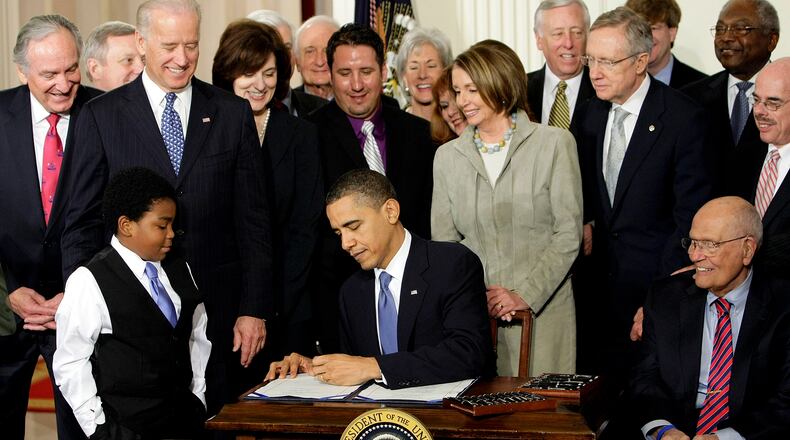The GOP approach to health-care reform seems to be the product of desperation mated with audacity.
As we've already noted, they don't have a plan. They've spent the last seven years telling the American people that they had a plan that would provide even better health insurance at even cheaper prices to even more people, but without ever bothering to devise such a plan or even anything that could plausibly be sold as such a plan.
Their dilemma is simple: Any plan ambitious enough to keep 20 million Americans on health insurance is far too ambitious for Republicans in Congress to support. And almost every element of the type of plan that conservatives would support -- much higher deductibles, taxes on employer-provided health insurance, the gutting of Medicaid, the privatization of Medicare -- would be deeply unpopular with the American people.
However, just because they don't have a plan doesn't mean that they aren't groping their way through the darkness toward at least a strategy, a strategy that appears based on the creation of panic, pain, chaos and destruction.
Look, insurance companies and health-care experts are pretty clear that with adjustments of the sort made to every major government program after its enactment, Obamacare would continue to function and continue to drive the percentage of uninsured even lower than its current historic low. Republicans of course have no interest in such adjustments. They don't want to make it work; they want to make it not work.
Indeed, those same health-care experts also warn that if Republicans continue on the course they have set -- repealing the taxes and mandates that support Obamacare while pretending to maintain its popular elements -- the whole thing will fall apart. A study by the nonpartisan Urban Institute predicts that if the Republican repeal strategy is carried out through the reconciliation process, as planned, some 30 million Americans will lose insurance, doubling the number of uninsured.¹
With healthy people no longer mandated to buy insurance, they'll drop out of the market and insurance rates will soar. Uncertain of their survival or source of revenue, insurance companies will stampede out of the market. With so many newly uninsured, hospitals and other care providers will see a four-fold increase in demand for uncompensated care, and they will confront that challenge with hundreds of billions of dollars less in revenue. It will be a complete and total mess.
Surely, Republicans want to avoid that calamity, right?
Well, some do. Some are suitably wary of that kind of brinksmanship, noting that in a recent Kaiser Family Foundation poll, just 20 percent of Americans support a repeal before the details of a replacement plan are put in place.
But Republican leadership, particularly in the House, appears to see that not as a disaster to be averted but as an opportunity to be created, and that approach makes a certain amount of sense to people desperate enough to try it. They have hidebound conservatives within their own caucus who will try to gut any solution that violates their highly developed sense of free-market purity. They have Democrats unwilling to cooperate in any way with the dismantling of Obamacare. How can they possibly bring those groups to the table to negotiate, on purely Republican terms of course?
Crisis, panic and chaos, that's how. They seem to have concluded that if millions of Americans start calling Washington demanding that something be done, and if they control the legislative mechanisms, that "something" can be done on terms that they find agreeable. Of course, navigating through that kind of self-induced meltdown would require a degree of leadership, vision, planning and coordination that is nowhere apparent in Washington, but if you're in Republican leadership, you may nonetheless see it as the only option available to you.
----------------------
¹According to the Urban Institute study: "Of the 29.8 million newly uninsured, 22.5 million people become uninsured as a result of eliminating the premium tax credits, the Medicaid expansion, and the individual mandate. The additional 7.3 million people become uninsured because of the near collapse of the nongroup insurance market."
About the Author
The Latest
Featured



